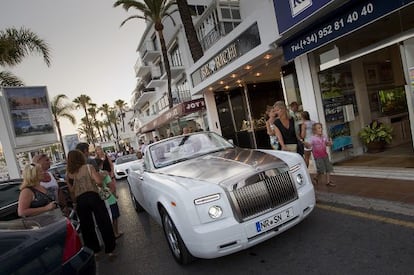Marbella, always Marbella!
For foreigners who are not willing to spend less than two million euros, the Costa del Sol resort has not lost its appeal

Marbella is undefeatable; it resists everything.
Seven years after the town was rocked by the property permit corruption scandal known as Operation Malaya, which led to the arrests of the mayor, her deputy and a host of other well-known figures, the situation in Marbella has not only returned to normal but there are also now signs of optimism that demonstrate the strength of “a first-class international brand” resort.
And real estate agents harbor no doubts.
"Marbella is known worldwide as a top-class destination, and its consolidated and quality markets have weathered the crisis better than in other places across Spain and other countries, in the sense that there have been fewer price reductions and more movement of properties," says Christopher Clover, manager at Panorama Properties.
Opportunities also prevail for middle-class Spaniards in residential areas such as Nueva Andalucia
Marbella is attracting hundreds of wealthy Russians, Qataris and Kuwaitis who are not willing to pay less than two million euros for a house. Opportunities also prevail for middle-class Spaniards in residential areas such as Nueva Andalucia, near Puerto Banús, where a penthouse can go for about 115,000 euros.
The peculiarities of the property market in Marbella have helped keep higher-priced homes from varying in value because of greater demand. On the other hand, lower-priced properties have dropped considerably, with prices ranging to 60 percent less than the appraisal value, according to some agents. Normally these homes are sought by buyers in the middle-class market.
Just like the movie stars and society figures that personify Marbella, property regularization has its own idols. For two months, Antonio Banderas has been remodeling his Las Gaviotas villa, which is located next to Monteros beach, so that he can give back to the town some 1,243 square meters from his garden, which will become a public pedestrian walkway.
It is the compensation the Málaga-born actor has had to pay for having the boundaries of his home illegally extended to a public area next to the beach, even though it wasn’t his fault. He bought Las Gaviotas with this current ground plan in 1997 from the heirs of the late influential radio talk show host Encarna Sánchez.

The Banderas case is the most famous of its type, but it is only one of thousands of urban re-zoning situations in which property owners and developers are trying to regularize their property boundaries under a municipal program.
The new General Urban Plan (PGOU) of Marbella, approved three years ago, appeared to be an exceptional system to regularize the tens of thousands of housing units authorized against the planning codes by the past administrations of the Independent Liberal Group (GIL) administrations. The PGOU established a system of compensation in terms of land or cash that promoters or property owners can reimburse the local administration with, in exchange for the losses of public spaces swallowed up by illegal encroachments.
Under this system, some 16,500 households that obtained illegal permits – some of which have not been completed – will be able to legalize their situation. So far, around 1,000 property owners and a hotel have been able to work out their permits.
The period of voluntary regularization for real estate agents was extended to one year but it has now concluded. Three weeks ago, the town hall agreed a timescale of three weeks to begin sending notices asking developers to meet their obligations.
Just like the movie stars and society figures that personify Marbella, property regularization has its own idols
"There is a very clear recovery," says Yolanda Preciados, CEO of Leisure Inmo.Service, who explains that there is growing demand from Scandinavians for quality products, and that certain groups and investment funds have again looked to Marbella. Having worked on the Costa del Sol for the past 25 years, the Navarre-born real estate agent is optimistic about the future.
Since the crisis, prices have not fallen more than 30 percent “although occasionally there have been some bank assets that have dropped more, especially those of Banco Sabadell,” she says.
Robin Adams of Sol Simple Properties complains that banks are slow to handle the financing of dwellings, and sometimes reluctant to hand out mortgages in order to prioritize the sale of their own holdings.
The British market – traditionally Britons were the lead buyers on the Costa del Sol – has “fallen to the point of being virtually at a standstill," Adams says, confirming that the boom in demand is coming from Scandinavia, whose citizens bring their own financing. Major investment trends are also being seen among the Qataris and Kuwaitis while buyers are also coming from Colombia, Venezuela and the Asian nations, even if they prefer properties in larger urban areas.
Sales in Marbella are very different to what is happening in the rest of the domestic market, which is nearly at a standstill despite drops in prices of up to 60 percent, according to Ricardo Balvís, director of the Gilmar office in Marbella, whose customers are primarily Spanish.
“The market is picking up, and that is good news, but on a negative note there remains the question of what to do with those properties whose values have gone down by 50 to 60 percent in some cases,” he says, pointing to the large stock of homes that are being held by banks and have been put up for sale "with very competitive prices and many easy terms of financing, which is pulling prices down."
"The banks are distorting the market," he complains, although he believes that by the end of the year they will have liquidated their stocks, which don’t account for much in Marbella or the rest of the Costa del Sol.
"There are spectacular, beautiful penthouses for a little under 300,000 euros,” he says.
During Easter, sales were made to clients who were on vacation and had no intention of purchasing a property.
Leonardo Cromstedt, a broker at Eralia Remaxr, said there are people who fled the Costa del Sol years ago because of the exorbitant prices and are now returning. “The market is not as bad as some pessimists suggest, but then again it is not all that good.”
He insists that Marbella will never experience the property boom that it did before the crisis.
But Marbella is one of Spain’s few destinations that has it all: climate, quality services, golf courses, shops, hospitals, international schools, good infrastructure, and the Málaga international airport with connections to many European cities.
Tu suscripción se está usando en otro dispositivo
¿Quieres añadir otro usuario a tu suscripción?
Si continúas leyendo en este dispositivo, no se podrá leer en el otro.
FlechaTu suscripción se está usando en otro dispositivo y solo puedes acceder a EL PAÍS desde un dispositivo a la vez.
Si quieres compartir tu cuenta, cambia tu suscripción a la modalidad Premium, así podrás añadir otro usuario. Cada uno accederá con su propia cuenta de email, lo que os permitirá personalizar vuestra experiencia en EL PAÍS.
¿Tienes una suscripción de empresa? Accede aquí para contratar más cuentas.
En el caso de no saber quién está usando tu cuenta, te recomendamos cambiar tu contraseña aquí.
Si decides continuar compartiendo tu cuenta, este mensaje se mostrará en tu dispositivo y en el de la otra persona que está usando tu cuenta de forma indefinida, afectando a tu experiencia de lectura. Puedes consultar aquí los términos y condiciones de la suscripción digital.








































